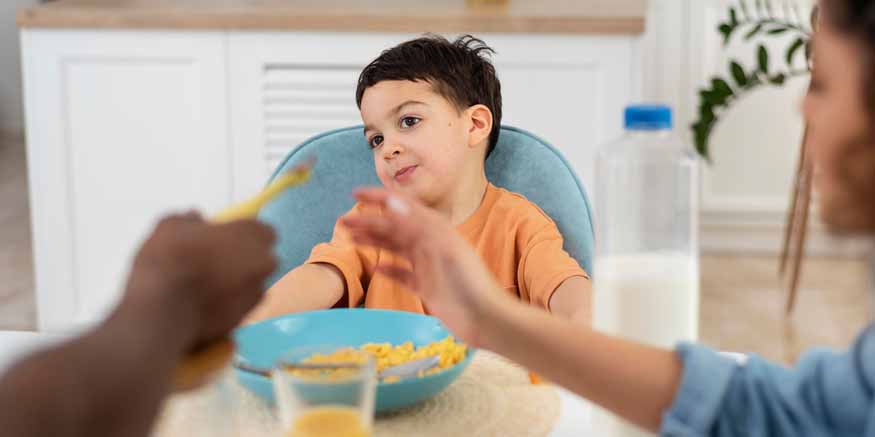Perfect Toddler Nutrition: A Parent’s Guide for Healthy Eating

One of the most constant concerns for parents on a daily basis is what to feed their child. There are so many different opinions and recommendations on health and nutrition today – from age-old traditional practices and beliefs, to modern-day nutritional guides .
With so much information around you, it is not surprising that many parents find feeding kids an almost impossible task. This article will help parents find easy tips on health and nutrition, ensuring that your kids get the right nutrients for their development and health.
Nutritional Needs for Toddlers
For parents of toddlers, health and nutrition is particularly concerning, as children between the ages of 1 and 3 years are in a growth spurt phase. At this time, their bodies and minds develop at a rapid pace, and need a healthy, balanced diet to support their growth.
Ideally, a toddler’s diet should include:
- Vegetables: An essential component of nutrition for toddlers, vegetables should be a staple in your kid’s diet. Aim for at least 2 portions a day – either a cup of salad or half a cup of cooked vegetables.
- Fruits: At least 1 piece a day, such as a banana or a slice of melon.
- Dairy: Include about 1½ servings of dairy products like yoghurt and milk in your toddler’s daily diet.
- Proteins: It is good to consume one serving of protein daily. The proteins which are good for your kids are lean meat, fish, poultry, eggs, and legumes.
- Grains: Give your kid about 4 servings of grains daily. These can include whole grains such as brown rice, wholemeal bread, and oats.
Guidelines for Healthy Eating
A proper diet is essential for children. It boosts their immune systems, promotes mental and physical growth, and aids in achieving the right weight. A variety of food also helps in the early development of healthy eating habits.
Balanced Meals
Children should eat a varied diet that covers all food categories. Here are some ideas for healthy eating guidelines:
- Breakfast: You can include pancakes with fruit and yoghurt, scrambled eggs with wholemeal bread, or wholegrain cereals with milk.
- Lunch: Options include a sandwich with cheese and avocado, macaroni salad with chicken, or vegetable and bean soup served with wholemeal rolls.
- Dinner: Smaller portions of meals served to the family. It can be stir-fried vegetables with rice, pasta with a healthy sauce, or meat with vegetables.
Snacks
To keep their energy levels in control, kids need snacks between meals. You can include healthy options such as:
- Fresh or tinned fruit
- Yoghurt
- Softened vegetable sticks with dip
- Cheese cubes
- Wholemeal bread with peanut butter or mashed avocado
Strategies for Feeding Toddlers
Creating a Positive Eating Environment
- Routine: Set daily meal and snack times to help children know when it’s time to eat.
- Distraction-Free: Put toys away and turn off the TV so you can concentrate on eating.
- Family meals: By seeing others eat, toddlers are encouraged to try new foods.
- Patience: Young children may be picky. It helps to constantly include new types of food in small quantities, which will allow them to try new things without putting them under pressure.
Avoiding Mealtime Conflicts
- Avoid Pressure: Never force your child to eat or empty their plate. Let their hunger decide the amount of food they consume.
- Healthy Options: If they refuse a meal, avoid providing unhealthy alternatives as a means to keep them fed. When they’re hungry again, offer them the meal they refused, or a healthy option instead.
- Positive Encouragement: Praise their efforts rather than using food as a reward or punishment.
Handling Picky Eaters
Kids are usually picky eaters, but they have to know the importance of nutrition. Here’s how to handle it:
- Variety: Serve a range of tiny portions of different dishes.
- Consistency: Rotate in new meals on a regular basis. You have to try multiple times for the kids to like it.
- Involvement: Take your kid’s help in making meals. Your kid will be excited to eat the meal they helped prepare.
Appropriate Drinks for Toddlers
- Water: The best drink for infants and toddlers to stay hydrated and avoid tooth rot is water.
- Milk: It is important for calcium and vitamin D. Make sure to limit intake to 500 millilitres each day to maintain hunger for other meals.
- No Sweetened Drinks: To prevent empty calories, do not give your kids fruit juices, soft drinks, and other sugary beverages.
Promoting Healthy Eating Habits
- Lead by Example: You must also eat healthy meals so that your kid sees and learns from you and does the same thing.
- Make Eating Fun: Create wholesome family traditions such as garden picnics or family breakfasts on Sundays.
- Train: Plan and prepare meals with them and have talks with them about food.
Nutrition for toddlers can be tough, but with patience and consistency, you can help your child develop healthy eating habits. Focus on providing a balanced diet, fostering a positive eating environment, and being patient with their eating habits. For parents looking for a nurturing educational environment for their children, consider Billabong High International School. We prioritise holistic development, ensuring your child’s physical, emotional, and cognitive growth. Discover the enriching environment at Billabong High International School, where comprehensive development is a priority. Visit our website for more details.













